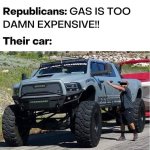Not long ago, the Left in the US - pretty much any socialist or socialist adjacent, along with a hefty portion of the Democrat Party - were telling us that we were not paying enough in gas prices, when compared to the enlightened European countries, and when examined in relation to the "true social cost of transportation."
For example, in January 2015, the average price of regular unleaded gasoline in the US was about $2.50 a gallon at the time. It was argued that this did not represent the true cost of transportation, and that we should have a giant gas tax to increase the price, so that the price we paid for gasoline reflected the true social cost of driving. And that would result in a $4.36 cents gas tax, which would result in Americans paying over $7.00 a gallon.
https://www.bloomberg.com/news/arti...-americans-don-t-pay-the-true-cost-of-driving
This was a common theme for years, including among the green energy crowd and Democrats in general. We weren't paying too much for gasoline. We were paying too little, and the price should at least double. I'm sure we all remember that.
Democrats have also taken steps to reduce oil production -
https://www.wsj.com/articles/democrats-for-higher-gas-prices-11647042264
Democrats supported higher gas taxes:
https://www.ncronline.org/news/opinion/signs-times/democrats-should-support-increasing-gas-tax
Remember when the Left cheered rising gas prices as "good for the environment?" You won't hear it from Democrats on Capitol Hill, but higher gas prices are a good thing for the environment. Expensive gas should slow the use of cars, and the pollution they emit. But politically savvy environmentalists aren't calling for taxes that would raise the price still further.
https://www.npr.org/templates/story/story.php?storyId=5378487
Some Democrats wanted us to pay more for gas to slow the climate crisis:
https://www.nytimes.com/2020/02/26/opinion/gas-price-climate-change.html - Is that still a good proposal?
Energy prices around the world are too low—far too low.
https://www.wri.org/insights/price-...ossil-fuel-prices-reflect-environmental-costs Birdsall highlighted the current U.S. tax on gasoline, which has been at 18 cents since 1993. “Correcting” this tax to account for gasoline’s environmental impact would raise it to about $1.60 -- had that been done in January, 2021, that would have raised the price of a gallon of gas to about $4.00 a gallon, give or take - about what it is now. So, this is what the Left wanted. They like this.
Well, the prices have nearly doubled in the past year and 3 months. Is that a good thing or a bad thing, and why?

